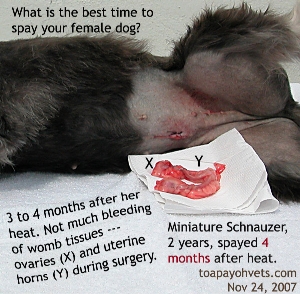She scheduled a surgery after
getting quotations from me and elsewhere. She is one of those rare
employees who cares about her boss's business - the need to
minimise expenses for her boss.
I suggested X-ray of the
bladder to confirm it. It could be a bladder tumour but the
hardness and crunchiness of the stones would lead to one diagnosis
- bladder stone.
 Since I do not have the X-ray machine, I asked her to get it done
at another practice. An X-ray is important to check whether there
are any other urinary stones in other parts of the urinary system,
other than the bladder.
Since I do not have the X-ray machine, I asked her to get it done
at another practice. An X-ray is important to check whether there
are any other urinary stones in other parts of the urinary system,
other than the bladder.
The other vet recommended a home-based diet to get the bladder
stone "dissolved." So, I did not hear from Jenny for some time
after the X-ray nor did I attempt to solicit business from her by
following up. Sometimes, I do lose cases to the competitor when
sending the dog for X-rays.
2 months later, Jenny phoned me to get surgery done and that was
how I cam to know what transpired after the X-rays.
"Stones felt like a figure of 8" Jenny said when she palpated the
bladder. "How could such large stones dissolve when the
home-cooked food is fed?" 2 months of home-cooked food and no
stones dissolved.
Reddish blood, bright and red stained the backside of the
Miniature Schnauzer every day.
Jenny's boss had accepted the medical advice of the vet to
dissolve the stones using home-cooked food.
But the female dog kept passing blood in the urine. Jenny decided
finally to operate. So, I told her that she had a conflict of
interest in the sense that she was my ex-nurse and now the other
vet had given a separate opinion to the owner who was her boss.
"How in the world can such a large bladder stone disappear?" Jenny
was skeptical and must have been very fed up with having to care
for this dog as well as being distressed in seeing blood in the
urine for so many months. "The dog is still passing blood in the
urine everyday!"
The conflicting veterinary advices had postponed the operation by
more than two months. What to do now? It was not a normal
situation for any dog to pass blood in the urine every day for so
many months.
Ultimately, it is up to the owner or the care-giver to
decide. If this was my dog, I would opt for surgery rather than
try medical dissolution of the struvite stones.
An infected bladder over time would lead to infections of the
kidneys or death. That would not be good for this dog.
Jenny decided to get the stones removed. It was better late than
never as this dog could just die in time to come as the bladder
ruptures or the toxins from the bacteria in the bladder spread to
the kidneys, liver and other organs.
 Follow up: Feb 4, 2007.
Follow up: Feb 4, 2007.
Four months after surgery, the dog was normal despite a delay of
more than 10 months of passing blood in the urine before the
surgical removal of the bladder stones.
Now she does not pass blood in the urine. She can control her
bladder and does not dribble urine or is incontinent.
She had been on dry food from puppy hood. Home-cooked food was
advised to prevent recurrence. Stones were not analysed but the
structure of the stones were indicative of struvite bladder stones
formed in an alkaline urine environment by urease-producing
bacteria.
Follow up: May 28, 2009.
Jenny said that there were no urination problems in the
Miniature Schnauzer. No prescription diets or regular urine tests
for bacteria or stones in the bladder were done on this dog as
most Singaporean dog owners don't believe in spending more money
than necessary.
The dog urinated normally everyday. That was the outcome desired
by the owner.
 "It is best that you do not
advocate surgery to be done by me," I advised my ex-nurse. "Your
boss may infer that you are drumming up business for me. He is a
really nice gentle giant from overseas. Courtesy and discretion
may prevent him from telling you and hence offending you."
"It is best that you do not
advocate surgery to be done by me," I advised my ex-nurse. "Your
boss may infer that you are drumming up business for me. He is a
really nice gentle giant from overseas. Courtesy and discretion
may prevent him from telling you and hence offending you." TOA
PAYOH VETS
TOA
PAYOH VETS

